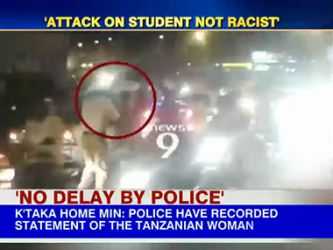After Bengaluru, it is time to reexamine racism, It Is not only slurs and assaults
What exactly is racism? Many experts have spent a lot of time debating this over the past few days, with a few saying that race opens a Pandora’s Box, and others maintaining that such a box needs to be opened. But what’s this racism experienced by students from African states in Bengaluru? We’re usually quick to reply that we’re not personally prejudiced, when accused of racism. However, racism need not only be individual — as when structures and associations discriminate against individuals on the foundation of their race, it can also be systemic.
In light of the strike against four Tanzanian students in Bengaluru, let us take a look:
There are approximately 7,000 students from different African countries studying in Bengaluru. Many of these students study in the innumerable private schools which have been set up in the city. All of these colleges charge foreign students substantially higher fees than they do Indian pupils, and many of these schools have a big base of NRI students who pay them huge amounts of cash in the hopes of an excellent education. Representatives of these schools, who get a cut of the fees receive by the colleges often approach within their home countries, pupils. Students generally make a down-payment in their own home country, and they are then given an admission letter, on the foundation of which they apply for a student visa.
Primarily, as soon as they come to India, pupils harassed by schools to pay cash over and above the fees and are always pestered. This may be imputed to a change in exchange rates — or just in the type of additional session fee, computer fees, blazer fees. When pupils are not able to pay this cash, they may be harassed by school authorities.
This harassment can be in the kind of withholding worse, or their exam hall tickets, withholding certifications that are bonafide. Schools certifying the pupil is studying in the school issue bonafide securities.
As a result, in the event the pupil will not possess a bonafide certification, the pupil is not going to have the ability to expand his or her residential license. Because of this, he or she is going to be guilty of an offence under the Foreigner’s Act, and could be detained. Pupils are blackmailed to make sure they pay enormous sums of cash to the schools.
Never mind the reality that the pupil’s inability to rekindle his/her visa is because of harassment and the cheating from the college. There have been instances where pupils’ passports have been illegally taken by the faculty, resulting expiration of which their visas and residential permits and, therefore, they have been arrested for overstay.
Second, in many instances, the facilities in the faculty do not match those promised in the prospectus. Buildings appear different, laboratories are non-existent, as well as the faculty is usually transitory and nearly always under-qualified. Small water is carried by the charges of a couple of pupils with university authorities, although students frequently attempt whining to the parent university.
These students have spent substantial sums of money to come to India, and often, on seeing the dearth of facilities, they want to alter colleges. Universities routinely refuse to issue students NOCs or charge them exorbitant sums of money for that certificate that is straightforward. More importantly, they refuse to return them and withhold the original certificates of the pupils.
What exactly does a student do if a school is harassing he or she? Perhaps, visit the authorities? The pupil may approach the FRRO, but the domain of the FRRO expands just to residential licenses and visas, and not the real lives of foreign students.
Many pupils manage to prevent this all and finish their classes.
Occasionally they might have a few back-papers they expect to complete in the subsequent year. Instead, they may be told to get an endeavor from their schools they shan’t participate in any prohibited actions while in India. No school will ever grant this kind of effort. Why? Can you think of one school that can vouch for what their students do outside school hours to the authorities? All pupils who approached the FRRO later went equipped with a copy of the order.
This is purposeful to the extent that pupils from Africa are concurrent as easy targets of exploitation, and as individuals prone to unlawful actions as well as the breakage of order and law. Pupils do not report this coincidence in various kinds of harassment from any other portion of the entire world.
Neither are pupils from any other portion of the world exposed to violence.
In July 2015, a bus conductor assaulted six Nigerian women. Despite there being no harms to the conductor, later, the girls were charged with assault. They are at current running from the pillar and are yet to finish their schooling -to post so they can get their visa expanded, to get their bonafide certifications.
The reaction of the state to these events is twofold — complete refusal or victim-blaming. Pupils who go to law enforcement to complain regularly called on the carpet on the criminal proclivity of all Africans.
What about the drinking, the fast cars as well as the loud music? In August 2015, a shopkeeper refused a pupil from the Ivory Coast smokes, and the pupil was beaten up by locals when he protested. In all these instances, arrests were made just following the intervention of activists and attorneys.
Above all, when pupils of African states complain of racism, they’re not merely referring to racial slurs and racially-motivated assaults. They’re referring to the systems that empower their exploitation, that leave them exposed to law enforcement, that vague their problems, and at the close of the day, make them suitable targets for misplaced rage. When the state encounters these events, its unwavering result would be to deny the inherent racism.
As if constructions don’t systematically refuse justice to a whole group of pupils just due to the colour of their skin.
Racism, like casteism, flourishes on its refusal — and the more the state refuses, the larger the impunity it allows to all these performers to carry on harassing and working these pupils.
Everybody makes money from this booming market of schooling.
The representative gets a piece from the fees; the schools receive payments worth a large number of dollars. Local landlords bill the pupils considerably more than Indian renters bill. Rickshaw- motorists often overcharge African students. On the other hand, no one intercedes when students are harassed and mistreated.
Like both officers in the instance of the Tanzanian students, everyone prefers to stand back and sometimes shove on a pupil back in the mob.















